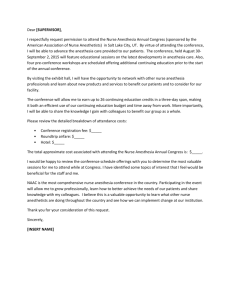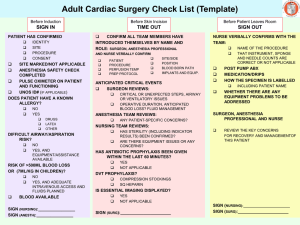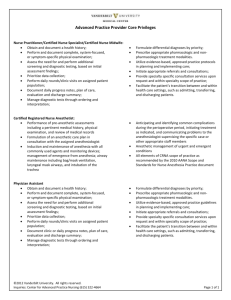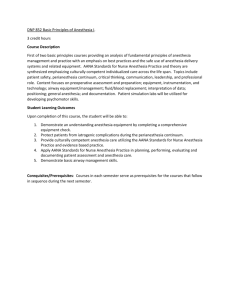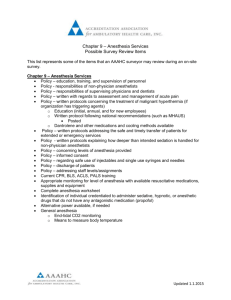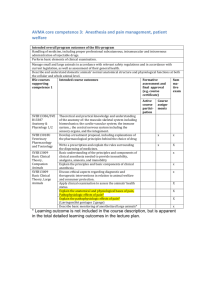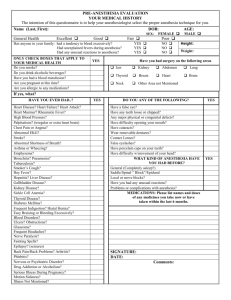PROPOSED MANDATE - Saint Joseph`s University
advertisement
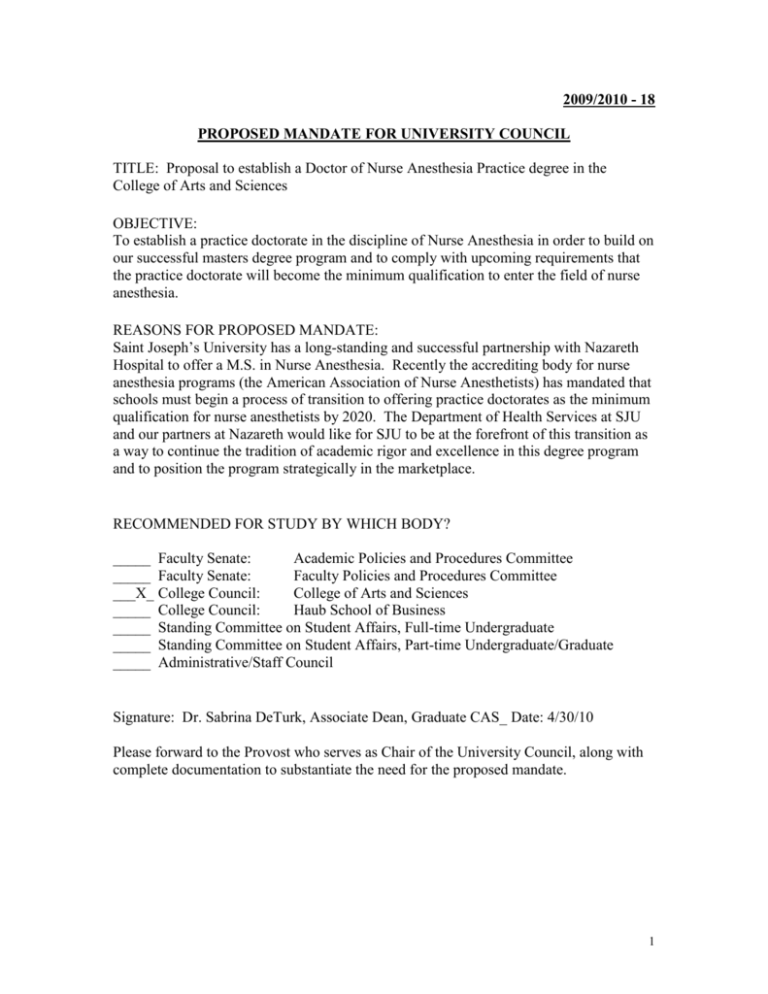
2009/2010 - 18 PROPOSED MANDATE FOR UNIVERSITY COUNCIL TITLE: Proposal to establish a Doctor of Nurse Anesthesia Practice degree in the College of Arts and Sciences OBJECTIVE: To establish a practice doctorate in the discipline of Nurse Anesthesia in order to build on our successful masters degree program and to comply with upcoming requirements that the practice doctorate will become the minimum qualification to enter the field of nurse anesthesia. REASONS FOR PROPOSED MANDATE: Saint Joseph’s University has a long-standing and successful partnership with Nazareth Hospital to offer a M.S. in Nurse Anesthesia. Recently the accrediting body for nurse anesthesia programs (the American Association of Nurse Anesthetists) has mandated that schools must begin a process of transition to offering practice doctorates as the minimum qualification for nurse anesthetists by 2020. The Department of Health Services at SJU and our partners at Nazareth would like for SJU to be at the forefront of this transition as a way to continue the tradition of academic rigor and excellence in this degree program and to position the program strategically in the marketplace. RECOMMENDED FOR STUDY BY WHICH BODY? _____ Faculty Senate: Academic Policies and Procedures Committee _____ Faculty Senate: Faculty Policies and Procedures Committee ___X_ College Council: College of Arts and Sciences _____ College Council: Haub School of Business _____ Standing Committee on Student Affairs, Full-time Undergraduate _____ Standing Committee on Student Affairs, Part-time Undergraduate/Graduate _____ Administrative/Staff Council Signature: Dr. Sabrina DeTurk, Associate Dean, Graduate CAS_ Date: 4/30/10 Please forward to the Provost who serves as Chair of the University Council, along with complete documentation to substantiate the need for the proposed mandate. 1 Proposal for Doctorate of Nurse Anesthesia Practice Degree (DNaP) Saint Joseph’s University in Partnership with Nazareth Hospital Overview The purpose of this proposal is to establish a post-masters practice doctorate degree in nurse anesthesia at Saint Joseph’s University and Nazareth Hospital School of Nurse Anesthesia. The program will be offered in an online format and tailored specifically for practicing nurse anesthetists. The curriculum is designed for successful completion as a one-year cohort offering, which utilizes an integral Capstone experience as the central scholarly component. The option for part-time matriculation could also be made available on a limited basis. The curriculum content for the practice doctorate in nurse anesthesia has already been well defined by the nurse anesthesia accrediting organization, the American Association of Nurse Anesthetists (AANA) Council on Accreditation. The curriculum is conceptually organized into three major components: professional leadership, education in nurse anesthesia, and practice scholarship. The program will be thirty credits, with eight individual three-credit courses and one six-credit Capstone course. I. Professional Leadership: Nurse Anesthesia Professional Practice, Quality Improvement in Patient Safety, & Ethics and Legal Issues in Healthcare. II. Education/Administration in Nurse Anesthesia: Leadership in Nurse Anesthesia Education Administration, Curriculum Development and Teaching Strategies, & Advanced Simulation in Nurse Anesthesia Education. III. . Practice Scholarship: Evidence-Based Practice in Nurse Anesthesia, Grantsmanship and Authorship , & an Integrative Capstone Project. Rationale Nazareth Hospital School of Nurse Anesthesiology and Saint Joseph’s University have enjoyed a successful collaborative educational partnership for over twenty years. There is high regard at Nazareth for the Master’s degree preparation that our anesthesia students receive from the Health Education and Health Administration graduate program. In 2005, Nazareth and Saint Joseph’s University achieved the esteemed ten-year re- 2 accreditation award from the AANA Council on Accreditation. As the maximum term granted, this ten-year re-accreditation is an external validation of our mutual capacity to graduate extraordinary nurse anesthetists. Over the past several years the AANA has been studying the significant transformational change that has occurred in the educational preparation of all allied healthcare practitioners; particularly as they transition from master’s to practice-focused doctoral degree preparation for entry into professional practice. These professions have included: pharmacy, optometry, audiology, physical therapy, and occupational therapy. Doctoral programs in these professions fall into two principal types: research focused and practice focused. Practice-focused doctorates are designed to prepare expert scholar- practitioners, who are skilled at applying credible research findings for the innovative and evidence-based advancement of the profession. Rather than the origination of new knowledge through a research and dissertation process, practice doctoral students carry out a scholarly Capstone Project that applies knowledge to solve a problem through translation of research into practice with the dissemination and integration of new knowledge. This year long project is a quality improvement initiative implemented in the educational, administrative, or clinical arena that culminates in the preparation of a manuscript suitable for submission to a professional journal. In 2008, the AANA officially decided to mandate the practice doctorate as the terminal degree for entry into nurse anesthesia practice. To allow adequate time for programs to transition to the practice doctorate, the AANA has set forth the following deadlines: new nurse anesthesia programs applying for accreditation after 2015 must be formatted as a doctoral curriculum program directors and associate directors must possess a doctorate by 2018 all nurse anesthesia programs must be organized as practice doctorate degree granting programs by 2020. While 2020 may initially appear distant and non-urgent, there are other factors that require consideration. The primary factor is our 2010 mid-accreditation cycle self-study 3 and the ongoing preparation for our reaccreditation process beginning in 2014. These two variables necessitate that Nazareth Hospital School of Nurse Anesthesia has a formalized plan for their successful future transition to a practice doctorate program. Nazareth has been working closely with the administrative faculty at Saint Joseph’s University, including John Newhouse, Sabrina DeTurk, and Bill Madges, over the past two years to devise an effective and successful transitional curriculum that will culminate in the achievement of the AANA 2020 practice doctorate mandate. This proposal for the implementation of an online post-masters doctorate of nurse anesthesia practice (DNaP) is the opportunity that will solidify the significant ongoing collaboration between our two schools. The majority of post-masters Doctorate of Nursing Practice degrees (including those that are anesthesia specific) are offered exclusively online or in a hybrid format. The implementation of the online post-masters DNaP program at Saint Joseph’s has several important factors that will contribute to programmatic success and ease of implementation. As a nurse anesthesia program that is offered through both a University and hospital that share a Catholic heritage and reputation for excellence, there has been a tremendous response from our alumni and their colleagues expressing desire to pursue their post-masters doctoral preparation at Saint Joseph’s. Contributing to its fine reputation is a well-established and respected Health Administration and Health Education graduate program, a new graduate Health Care Ethics program, as well as, a Doctoral program in Education. The graduate program in Health Administration launched an online degree program in Spring 2010 that has attracted a significant number of students, indicating that demand for online programs among health care professionals is high. The online Doctoral program in Nurse Anesthesia would have the option of providing a residency component for its students, similar to that planned for the online Organizational Development and Leadership program. Nurse anesthetists are highly specialized providers of care and, as such, are fundamentally attracted to a doctoral curriculum that has been designed for their advanced practice role in anesthesia. St. Joseph’s University will be the only regional 4 practice doctorate program specializing in nurse anesthesia in a region that has the most concentrated amount of nurse anesthesia graduates across the country. In addition, our collective full-time nurse anesthesia cohort starting September 2009 is the largest to date with twenty-five students. These students represent a large proportion of prospective applicants who will desire to continue their matriculation into the new DNaP program, as all graduates will likely seek doctoral preparation in order to have educational parity with future colleagues. The SJU Plan 2010: The Path to Preeminence calls for an official recognition of curricula at Saint Joseph’s University that fulfill the criteria for consideration as a signature program. Nazareth Hospital School of Nurse Anesthesia fulfills many of those signature program characteristics detailed by the University as requisite benchmarks for excellence. Also, the implementation of the DNaP program at Saint Joseph’s University will ensure the continued preeminence of Nazareth and Saint Joseph’s as the prominent educator of highly regarded nurse anesthetists known to be cultivated in the academic excellence of the Jesuit tradition. Accreditation and Timeline for Implementation According to Kathleen Gaval, regional accreditation for a new post-masters practice Doctorate will likely be required from the Pennsylvania Department of Education and Middle States. Upon Saint Joseph’s University approval for the institution of the DNaP program, the AANA Council on Accreditation self-study process can be initiated and will be done by Nazareth Hospital School of Nurse Anesthesia faculty. Timeline for implementation of the DNaP program is, therefore, entirely dependent upon the successful completion of these processes. With consideration of the recent past experience of colleagues engaging in these approval and accreditation processes, a realistic and anticipatable start date would be Summer or Fall 2011. The existing Master’s degree program in Nurse Anesthesia will continue to run for at least 2 – 3 years after the launch of the DNaP program. We anticipate that there 5 will still be a demand for Master’s degrees in this field for some time. However, as 2020 approaches, SJU and Nazareth will look at how to combine the Master’s and Doctoral programs into one degree program that satisfies the requirement that all nurse anesthetists be doctorally prepared. Projected Enrollment and Tuition An initial 15 students is a reasonable first-year cohort. This amount is appropriate to achieve a meaningful collaborative online academic community and is manageable for current Nazareth nurse anesthesia faculty to serve as academic advisors for the integrative Capstone Project. There is tremendous potential growth opportunity, as each successive year there will be over 150 nurse anesthesia graduates in Philadelphia of whom the desire to achieve doctoral preparation will continue to mount as the 2020 AANA deadline approaches, at which time, the DNaP will become the required degree offered by Saint Joseph’s for all Nazareth nurse anesthesia students. Additionally, as an online program, the DNaP will be recruiting students nationally. Resources (see enrollment projections and budget below) The program would require an upfront investment of $222,000 in the first year to cover costs of course development and faculty. However, if enrollment projections are accurate, the program would still generate positive net revenue in that first year of $156,900. An open question is whether to develop and market the program through our partnership with Deltak (the organization which currently markets and recruits for our online degree programs in Graduate Arts and Sciences) or to keep both the development and marketing/recruiting of the program in house. If the program is run with Deltak (the model used in the budget assumptions provided here) they would cover marketing and recruiting expenses, but also take a share of the generated revenue. Given the very niche market for this program, it might be viable for SJU to run the online DNaP without Deltak’s assistance (utilizing the current marketing budget and recruitment structure in Graduate Arts and Sciences) and thus retaining all net tuition revenue. The pros and cons of each option will be carefully vetted should the program receive approval. 6 Curriculum The DNaP program is designed for students who already possess a Master of Science in Nurse Anesthesia degree, obtained either at Saint Joseph’s University or another accredited institution. Students will enter and progress through the program in cohorts of no more than 20 students. Semester 1: GRA 7xx Nurse Anesthesia Professional Practice (3 credits) Emphasizes learning through advanced clinical experiences in anesthesia practice. Explores concepts of nurse anesthesia practice, competence, and expertise, the use of critical thinking skills, and reflection as an evaluation method. This course prepares students with skills and competencies needed to build and assimilate knowledge for establishing a scholarly trajectory at a high level of complexity. This is the foundation course for the culminating Capstone project focusing on improving nurse anesthesia practice or education. GRA 7xx Quality Improvement in Patient Safety (3 credits) This course focuses on the role of the nurse anesthesia leader in quality improvement initiatives. Introduces a systems approach to error investigation and analysis. Focuses on the analysis of adverse patient events from a systems perspective and the use of multidisciplinary teams to solve patient management problems. The emerging scientific knowledge base for assuring and improving patient safety outcomes is examined. Adherence with governmental regulations requiring the ongoing collection, assessment, and reporting of key metrics and the achievement of safety benchmarks is discussed. GRA 7xx Ethics and Legal Issues in Healthcare (3 credits) This course provides a foundation for values, codes, and legal principles governing decisions in advanced nurse anesthesia practice, conduct, and relationships. Legal aspects addressed include: medical malpractice, informed consent, patients' rights, billing fraud and abuse, and governmental regulation of health professions and healthcare facilities. Using the AANA Code of Ethics as a frame of reference, real-life case scenarios of difficult or controversial decision-making are examined. 7 Semester 2: GRA 7xx Evidence-Based Practice in Nurse Anesthesia (3 credits) This leadership course provides a foundation for life-long scholarship, utilizing evidence-based practice. Specific skills for evaluating, interpreting, and integrating scientific research into nurse anesthesia practice and education are developed. The course consists of a clinical component where students engage in an evidence-based practice project with their assigned mentor applying concepts of evidence-based practice. GRA 7xx Grantsmanship and Authorship (3 credits) This course introduces students to strategies, skills, and technical competencies for grant seeking and writing. Authorship strategies, skills, and technical competencies are developed. Doctoral students are expected to submit a manuscript detailing their respective Capstone project, that is suitable for publishing, prior to graduation. GRA 7xx Advanced Simulation in Nurse Anesthesia Education (3 credits) State of the art simulation training instruction is provided in an operating room setting with a high fidelity simulator. Current strategies are reviewed for enabling students to acquire the technical, leadership and teamwork skills required to effectively respond to the challenges of high acuity - low occurrence anesthesia scenarios, such as malignant hyperthermia, shock, MI, anaphylaxis, and difficult airway/ intubation. Semester 3 and 4: GRA 7xx Curriculum Development and Teaching Strategies (3 credits) Examines principles of teaching and learning applicable to the anesthesia didactic and clinical environment. Presents strategies in teacher/learner communication, presentation development and strategies, curriculum design, and methods of evaluation pertinent to nurse anesthesia education. GRA 7xx Leadership in Nurse Anesthesia Education (3 credits) Provides analytical, critical, and innovative thinking regarding topics pertinent to support and improve the performance of nurse anesthesia education. GRA 7xx Integrative Capstone Project (summer I & II ~ 6 credits total) This course provides for the further continuation of the evidence-based practice 8 Capstone project with their assigned mentor. Students engage in the selection and implementation of appropriate Capstone evaluation methods. Data regarding the Capstone efficacy of enacting an evidence-based quality improvement initiative is evaluated. Meaning is derived not only from the evaluative data, rather also from the Capstone experience in totality. The student's plan of action for continuing on a scholarly trajectory are delineated and emphasized. Projected Budget - DNaP Program assumes first cohort of 15 starting each summer from 2011 forward Gross Revenue Projections Courses Offered Total Registrations/year (15 students x 9 courses) Credit Hours/year (registrations x 3 credits Per credit tuition* Revenue($800/Cr) * current Ed.D. tuition level w/3% incr./year FY 2012 FY 2013 FY 2014 FY 2015 10 10 10 10 150 150 150 150 450 450 450 450 842 867 893 920 $378,900 $390,150 $401,850 $414,000 Expense Projections Course Development Costs ($18K/Course) Adjunct Faculty Cost ($6K/Course) Expenses Total FY 2012 FY 2013 FY 2014 FY 2015 $162,000 $0 $0 $0 $60,000 $60,000 $60,000 $60,000 $222,000 $60,000 $60,000 $60,000 Net Revenue Projections Total Generated Revenue SJU Revenue (assuming 50% split w/Deltak) FY 2012 FY 2013 FY 2014 FY 2015 $156,900 $330,150 $341,850 $354,000 $78,450 $165,075 $170,925 $177,000 9 Proposed Schedule of Courses - DNaP - first 9 semesters of offerings Semester Summer 2011 Course GRA 701 GRA 702 GRA 703 Cohort DNaP 1 DNaP 1 DNaP 1 Fall 2011 GRA 704 DNaP 1 GRA 705 GRA 706 DNaP 1 DNaP 1 GRA 707 DNaP 1 GRA 708 GRA 709 cohort 1 DNaP 1 completes DNaP 1 May 2012 GRA 710 GRA 710 DNaP 1 NOTE: the capstone is a 6 credit course shown here as 2 courses to facilitate budget projections Summer 2012 GRA 701 GRA 702 GRA 703 DNaP 2 DNaP 2 DNaP 2 Fall 2012 GRA 704 GRA 705 GRA 706 DNaP 2 DNaP 2 DNaP 2 Spring 2013 GRA 707 GRA 708 GRA 709 GRA 710 DNaP 2 cohort 2 DNaP 2 completes DNaP 2 May 2013 DNaP 2 Summer 2013 GRA 701 GRA 702 GRA 703 DNaP 3 DNaP 3 DNaP 3 Spring 2012 LEGEND Temporary Course # GRA 701 GRA 702 GRA 703 GRA 704 GRA 705 GRA 706 GRA 707 GRA 708 GRA 709 Course Name Nurse Anesthesia Professional Practice Quality Improvement in Patient Safety Ethics and Law in Healthcare Evidence-Based Practice in Nurse Anesthesia Grantsmanship & Authorship Advanced Simulation in Nurse Anesthesia Education Curriculum Development and Teaching Strategies Leadership in Nurse Anesthesia Education Integrative Capstone Project I Integrative Capstone Project II 10
